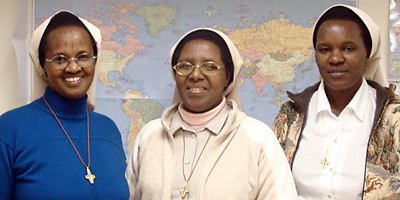
 CHARLESTON—The Sisters of St. Mary of Namur who serve in South Carolina are doing what they can to help their order in the Republic of Rwanda.
CHARLESTON—The Sisters of St. Mary of Namur who serve in South Carolina are doing what they can to help their order in the Republic of Rwanda.
The parishes and schools they serve here send letters and photos in a cultural exchange, and make donations both large and small.
Recently, the congregation itself brought three of the Rwandan sisters to the United States for an intensive, three-month immersion in English to help them learn their country’s new language.
The indigenous language of Rwanda is Kinyarwanda and it is common to all, but the official language was French until 2008.
The sisters who spoke to The Miscellany said the decision to switch to English seemed to happen overnight, and it put Rwandans, especially those involved with education, in a quandary.
Suddenly everything was in English: road signs, billboards, instruction forms. School teachers were supposed to hold class in English, but didn’t know the language themselves.
Sister Kathleen Kane, pastoral associate at St. Francis by the Sea Church, said the people had been through so much, everyone just wanted to reach out and help.
She said Rwandans are still struggling to recover from the genocide of 1994, when 800,000 Tutsis were killed.
Sister Sandra Makowski, diocesan chancellor, said it is hard to imagine what it is like for the Tutsis and Hutu, who are now working alongside one another after the massive killings.
She was in Rwanda last year to teach English to her community and said the pain is still palpable, but she would love to return.
“It was probably one of the most rewarding things I’ve ever done,” she said. “Every time they learned an English word their faces would light up. It was like learning English was going to bring good changes.”
Officially, the language change is a result of joining the East African Community, which is made up mostly of English-speaking countries such as neighboring Uganda and Tanzania.
But there are underlying factors. Relations between Rwanda and France have been strained since the genocide, when France was accused of supporting Hutu militias.
Also, Rwandan President Paul Kagame speaks fluent English. He spent many years in English-speaking countries when his family fled earlier outbursts of ethnic violence.
Sister Sandra said when Kagame returned to lead the country he brought an English-speaking culture with him.
After their visit to Rwanda, Sister Sandra and Sister Mary Veronica White proposed that their congregation fund Project English, and bring two or three Rwandan sisters at a time to the United States for an immersion experience.
Sisters Dancille Mukamusoni, Claire Marie Mukambayire and Marie Odette Mukankiko, who arrived in March, are the first of what Sister Sandra hopes are many more to come.
Several sisters from the Diocese of Charleston have traveled to the host province in Buffalo, N.Y., to visit their Rwandan counterparts and offer support.
Sister Roberta Fulton, principal of St. Martin de Porres School, said she wishes the Rwandan sisters and her students could meet as they have spent several years corresponding and praying for each other.
The school raises money each year for the African country.
“It’s a project very dear to our hearts,” Sister Roberta said.
Students at St. Francis by the Sea School have also reached out to the SSMN province.
Sister Kathleen said they have bought pigs, goats and other livestock for Rwandan families, supported the education of children and corresponded with their sister school.
The fifth-grade class recently created a booklet of psalms for them.
“The sisters have responded to the children, which helps them learn English,” Sister Kathleen said, “and we both get to learn about our different cultures.”
